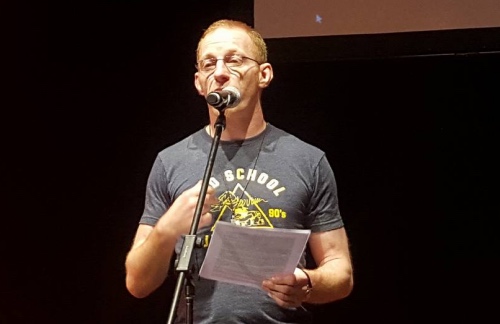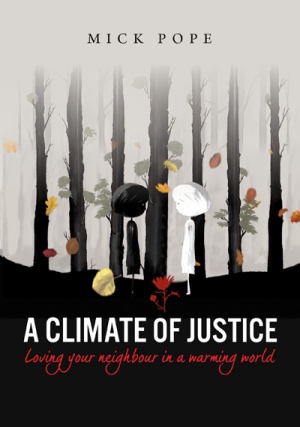
Dr Mick Pope, based in Melbourne, is a climate change scientist, university lecturer and eco-theologian. The 48-year-old speaks to DAVID ADAMS about his hopes for the COP23 talks in Bonn, how the church is engaging with the issue and the message in his latest book, A Climate of Justice: Loving Your Neighbour in a Warming World…
Dr Mick Pope, based in Melbourne, is a climate change scientist, university lecturer and eco-theologian. The 48-year-old speaks about his hopes for the COP23 talks in Bonn, how the church is engaging with the issue and the message in his latest book, A Climate of Justice: Loving Your Neighbour in a Warming World…
First up – the COP 23 climate change talks have commenced in Europe this week. What do you hope to see come out of these latest talks?
“America falling back into line, which is probably too much to hope for at present. One of the things that came out of the last COP meeting was a pledge to stay under one-and-a-half degrees above pre-industrial levels. I recently read a paper that said the chance of that now…is about one per cent…So we really need agreements for some urgent action, commitments that are binding – that see us really draw together as a global economy and really hit the targets hard…[W]e’re already seeing huge impacts in terms of one degree of warming…so two to three degrees is just going to be completely disastrous for human civilization. COP needs to deliver…”

Dr Mick Pope
“[The book says] that if you love God, you must therefore love your neighbour and love of neighbour means a love of justice…If you care about justice, you [should] care about climate change as well because there are any number of ways in which climate change intersects with justice issues.”
Is the game over if the US don’t join in?
“I don’t know that it is, although they’re a huge contributor to global omissions. I’m reading a lot now that’s suggesting all the things that President Trump is trying to do – get the coal industry really kicking again and tying that to jobs – is just a waste of time. Not just because of the fact that the number of people employed in the coal industry is small and ever-diminishing…but because renewable energy is surging ahead anyway…[We also] have to look at countries like China and see what they’re doing and [while] their emissions continue to climb…they’re taking climate change seriously. So it’s not a done deal if the United States aren’t on board because they’re about the only country [who aren’t on board*]…but it is meaningless unless every country who is on board takes it really seriously. So it’s not a lost cause…”
What about locally – what’s your take on how Australia is addressing this issue at present?
“Well, [Indian company] Adani is the big elephant in the room – it’s symbolic of the current position of the government which is to, on the one hand, at least notionally prepared to accept that climate change is real but on the other not be prepared to invest where we need to…[Adani’s proposed Carmichael coal mine in Queensland] is a bad idea for any number of reasons in terms of direct impacts on the [Great Barrier] Reef and on the land and on farming and on water supplies and on a whole bunch of other things – and just what it says about the way the whole political system works. And then [the Government] commissioning a major report on climate and ignoring a renewable energy target – it’s like saying ‘We care about climate change, we think it’s real, but we’re not going to do anything serious towards it’. So I don’t think, from a policy point of view, the country’s tracking very well…Australia and in the United States, in a sense, stand together in that they’re considering new fossil fuel sources and not really investing in renewables in the way we should. So it’s not looking good at the moment.”
What is the key to changing that attitude in Australia, particularly? Is it about getting the public more engaged, that they will pressure politicians to actually move on the issue. And how do you do that?
“Well, I think it’s already happening with Adani. And one of the things about that is there’s such a broad coalition in terms of those who see it’s such a bad idea….When you see [Indigenous groups] getting together with farmers, with environmental activists…you can see there’s something of a cultural change in many ways. I know it’s not broadly across Australia…[but] I think there is a seachange. There’s a lot of people who do want to see climate change action.”
Your latest book, A Climate of Justice, was launched at the Justice Conference in Melbourne last month. What essentially is the message you’re presenting in the book?
“The book was designed to fit in with the conference theme which was ‘Love Thy Neighbour’. So the full title of the book is A Climate of Justice: Loving Your Neighbour in a Warming World. [The book says] that if you love God, you must therefore love your neighbour and love of neighbour means a love of justice…If you care about justice, you [should] care about climate change as well because there are any number of ways in which climate change intersects with justice issues. So there are chapters on, for example, foreign aid and how climate adaptation is going to require a lot of money to make communities overseas more resilient. Because it’s the poorest who have contributed the least to climate change…”
Are you hoping that the church, that Christians, will become more active as advocates in this area?
“Yeah, I’d love to see that…There are all sorts of ways in which Christians are starting to raise this issue and say ‘Look, this is a major issue for humanity as a whole, it’s affecting the poor now’. And so if this book helps people to connect the dots a bit more and take on the challenge of stewardship of our planet more seriously, then that would be a great outcome.”
What about for you personally – how did your role as a climate scientist and your faith intersect?
“About 15 years ago, I was asked by a friend of mine, Gordon Preece, who’s my boss at Ethos – the EA Centre for Christianity and Society, to write a paper on climate change and theology. And I’d never really thought about it, oddly enough – I’d…never put the two together. When I started to read about the impacts upon people in Oceania now and the various ways in which the poor suffer due to the impacts of climate change and started to think about the future the entire planet is headed for with three to four degrees of warming, even two degrees of warming, I started to become concerned. And coming from an evangelical background, I wanted to deeply integrate that with my faith and my understanding of the grand narrative of the Bible, from Creation to New Creation, and understand how those two went together…So it’s been a long journey of thinking about what the Bible says about Creation, what the Bible says about…our role, what it says about the resurrection of Jesus and its implications for the planet as a whole. And then thinking about our responsibilities in that fashion.”

“I think that if you read the Bible with fresh eyes and understand how much God values the creation that He’s made and then are willing to look at the science without certain prejudices or concerns… [and] put that together with something that’s as fundamental as the doctrine of sin – that human beings do bad things…you can understand climate change through a fairly traditional Christian lens and then how that calls us to action.”
There are those within the church who deny climate change is occurring or that man has made any contribution to it. Is that frustrating?
“Yeah, of course it’s frustrating in the sense that I can understand some Christians’ concerns – there are a number of ways in which climate change science automatically plugs into a whole lot of other issues about people’s worldviews, their understanding of the Bible, their concerns about politics…But nonetheless, I think that if you read the Bible with fresh eyes and understand how much God values the creation that He’s made and then are willing to look at the science without certain prejudices or concerns… [and] put that together with something that’s as fundamental as the doctrine of sin – that human beings do bad things…you can understand climate change through a fairly traditional Christian lens and then how that calls us to action.
“I guess the other thing that Christians get hung up on is understanding certain texts about the ‘end of the world’ and think that it’s just going to be all burned up. But my favorite ‘go to’ text is Romans, chapter eight, and that not only talks about the resurrection of the body – of people being liberated from the decay of the body – but the whole of creation groaning with birth pains and its looking forward to its own redemption. So when you can start to see those texts in the Bible and see how that provides a lens, a framework…that surely should help us understand what our role’s going to be in terms of good steward[ship].”
Lastly, I wanted to return to where we started with the talks going on in Bonn at the moment. How optimistic are you about the future?
“I can’t afford not to be optimistic. Governments make me incredibly cynical, I have to say, but if I go back to something like the Adani coalmine and the opposition [to it], the groundswell, I think I have some hope in that people power…So on that level I’m hopeful…
“Obviously as a Christian too, I have to be hopeful, but that’s kind of a longer burn thing, if you’ll pardon the pun, in that eventually Christ will come back and it will be the end of all things, but that’s no guarantee that things won’t get to a really bad state before that. So, on the one hand I’m hopeful from a theological perspective, on the other I’m hopeful from a community perspective but from a government perspective, they seem to show huge inertia and usually pander to more conservative values.”
* Syria, which was the only other country which hadn’t signed up to the Paris agreement, announced this week that it would sign.
Mick Pope’s book, A Climate of Justice: Loving Your Neighbour in a Warming World, is published by Morning Star Publishing.
This interview has been edited for length and clarity.





